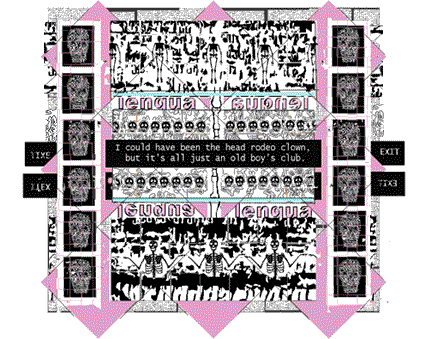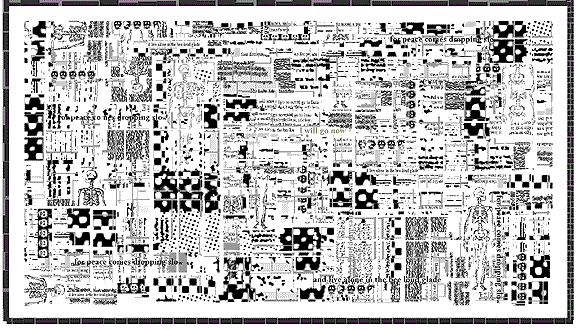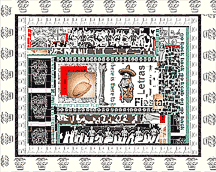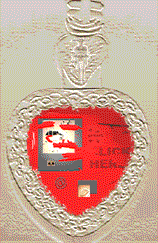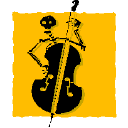Notes Toward CyberFolk, Web
de Muertos, and the Human Idiotic
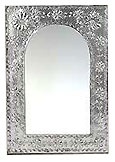
(Being
another digital amble, a scrolling tumble, in search of the minor
miraculous. Nothing more.)
( A way to keep track of my head tambien. Making tracks
for the mind. Finding
the mind's tracks.)
(And a search for fearlessness. Tambien.)
(Porque yo soy una mestiza loca des letras.
CyberFolk. Folk Theory. Not the theorizing of anything folk, but theory itself which is "folk." That is, marginal (produced by people without power), anonymous (in its lack of official recognition), and primitive (in its disregard for certain formal protocols). But theory, as theory, is intensely self-conscious (hence not folk) and often academic (hence not folk) and of the mind (hence not folk). "Folk theory," then, is a cheerfully self-canceling notion which doesn't pretend to encircle or fix any category or truth, but which asserts itself nonetheless. And how about "folk cyber art." Also something of a contradiction of course, because, for one thing, folk art is traditionally made of hardcopy materials, rustic tangible stuff. And it is only disseminated locally. What I'm envisioning will instead be electronic cybermatter, concoctions of air and displacement and digits, splashed all over and throughout the cyber-ether, but "folk" too because unrefined. Culturally confused culturally fused. Without adequate representation. |
Rita, Patron Saint of Lost
Causes and
|
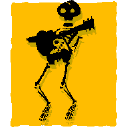
Really, the Web is crawling with death. It is the Database of Death, Database as Death. It is masses and masses of stuff, and masses and masses of stuff, I'm saying, is what death in some sense is. Dumb, numb, and blind accumulation. Accumulation beyond count. Things. And isn't that
what death is: uncountable. Because anything touched by death is immediately emptied of content.
Though death itself is all content. And never as vague as I am, trying to talk about death. Because Death is nothing if not exact. And Death itself of course can count. Like a son of a bitch.
Death, that idiot savant.
Retablos, Ex-votos, Nichos, Amates, Ofrendas, Azulejos, , Papel Picado
Beautiful, moving, ugly and rustic, the religio-commercial folk art STUFF of Mexico. They honor, witness, minister, mock and explore. Mock the sinister and minister the soul. Mock the soul. Minister the sinister. Nicho,


Contemporary versions tend to include traditional images from the Mexican
loteria (bingo game): hand, bird,
bottle, death. You might also see papier mache figurines: a wedding couple,
for instance, side by side with grinning skeletons, themselves decked out
in wedding garb—Day of the Dead calaveras, of course. In such arrangements
the presence of calaveras, in typical fashion, wryly mocks the living. They
lighten and leaven the inevitable end of all action, including love, including
marriage, even as the living are hard at work on
those very actions.
Meanwhile other nichos depict other kinds of scenes. "Anima solo," for example. Lone soul frying in purgatory.
My Nicho.
I'd like to take some of that yellow graph paper used in offices, and paste in hundreds of itsy bitsy icons.
If I put some tiny, symbolic object there, perhaps the pain inside of me will stop.
We have always needed some modest space—a table, a stone, a tin can flattened and bent into a box—to acknowledge the things which overwhelm us.
If I can just identify a few small meanings and place them there, and there. Like so. Then I will understand what is happening to me.
If I can move them around, make a number of arrangements.
If I can produce them in mass, if I can send out an ocean of these small, apologetic configurations…
Or how about COMPUTER SCREEN as nicho? The screen itself as the space for positioning devotional things. Place to keep track, to position and store, bind and arrange. Joseph Cornell meets the Virgin of Guadeloupe meets the silicon diode.
To arrange. To send out in mass.
To display. Bear witness. Erase and then bring back
the next morning or the following year.
Perhaps most of all to erase. Cut. Delete. Expunge.
In order to remake. Even our rituals must now be accelerated
to well beyond the yearly. We need to make and erase in megahertz.
If I could send out a cyberwave of shy, expendable configurations…
*
Dave, stop.
Stop, will you?
Stop, Dave.
I'm afraid.
I'm afraid, Dave.
Dave, my mind is going.
I can feel it.
I can feel it.
My mind is going.
There is no question about it.
I can feel it.
I can feel it.
I can feel it.
*
Rustic Mexican Nicho I Found on the Web
Strange how the angel in this picture seems to hold the stage itself down with her staff, as though for maximum flight by the man. While the peasant-shirted farmer is lifting his arm, ready to elevate nearly, right out of his boots. Glazed look in his eye.
While his little white donkey, head jutting through the frame to the left, just wants to exit the stage. Just wants to get out of this particular scene. He’s looking pretty stressed, the donkey. He's looking angry and edgy. Wants to head out over the countryside, a lateral move, because there are no doubt additional worlds right here in this lonely world, and why not. Meanwhile, as I said, the angel just wants to stick. She's trying to locate the exact spot of ground from which one is saved from the ground, and the farmer man, of course, just want to rise clean away.
Interestingly, no one in the scene has actually managed to leave, nor at the same time managed to stay, exactly. They are merely frozen in their various versions of leaning.
Oh—I forgot the dove at the top of the scene, from which literal rays seem to be pouring. This white bird is utterly fixed on diving straight down, straight down from heaven of course, into the very skull of the man.
And while the dove, like everyone else, is frozen in place, getting nowhere, it is her odd static energy perhaps which holds it all together. What with everyone inclining as they do, consider how easily it might all blow apart.
She's the closest thing in the scene to being outside the scene. But I really can't tell for sure that she is.
And I could just as soon think that the rays coming down are nails driving into the man, fixing him fast between here and there. That his stunned expression means I don't know, or else I do but I have no way to say. No one else, neither animal nor angel, and despite how they lean, has quite the same look.
Dangerous and problematic these days to say that word "human," of course. Suggests of course some essential, general humanness independent of culture, race, gender—all the dirty, impolite and asymmetrical particulars of everyday ins and everyday outs. But in the script we have before us, the straw-woven box with its powdery figures, concoctions of wheat paste and water that lean, really, only in relation to each other’s leaning, "human" appears to be on the bill.
Or maybe I should say "human man." Because the angel is indeed specifically female, and the man is clearly male. So yet another reading is that “female” is what fixes the floorboards in place so the male can depart. Or attempt to depart. The female is what administers the material ground from which spiritual salvation, or at least abstract reflection, or imagination, perhaps, is possible. Without the material there is no immaterial. Without a self there’s no freedom from self, and the other way around.
And still I wonder, after all, if it isn't the little donkey who's got things right. He's the horizontal part of the cross. The man reaches continually up to outside, while the woman keeps pointing down, down and in, into earth, into the body, where the outside in the form of a center is found. Or is thought to be found. While the little donkey just wants to live, I think, without breaking his back.
That little donkey is probably thinking: you can use the word human, ok, but let's change it to "human idiotic." Let’s change it to “
human.” Meaning we know full well that even this old enlightenment word is itself idiotic by now, but we have no choice but to use it. Because, face it, we're still on the same old stage, even though we know it now a little bit better or a little bit differently. Because we're pretty much glued and wired and bolted in. The script itself so instructs. That's what the script itself says.
Retablos,

also called laminas, were small oil paintings made to venerate the zillion Catholic saints. A device of the Spaniards to woo the native people. Or rather convert them. Conquest, conversion—I get 'em mixed up. By the 19th century retablos were manufactured in the thousands. Apparently someone thought that truly excessive production and distribution could somehow make up for what had to have been, all things considered, and up to that point, some rather pathetic efforts to console. Just keep on producing stuff. Try to outproduce death.
The world is so much with
us, late and soon, getting and spending,
I will rise and go now, and go to Innisfree
and hear lake water lapping, and live alone in the bee loud glade.
If a remote is handy, I'll even put the bees on mute.
Though when noise get loud enough, of course, it becomes noiseless and
white,
so maybe I'll turn the bees up.
White is some consolation, after all, even if it isn't
the very sustenance of despair.
I can feel it.
*
I'm looking now at a pretty, antique retablo I found on the Web, God himself featured in the foreground. He's squeezed into a shiny gold chalice and pointing, I think, to his own halo. That's God for you. There's an itsy bitsy farmer in the distance, wondering, no doubt, what is going on, two angels hovering in-between earth and sky, and a single staring eye, of course. A gigantic eye suspended over everything, in what by now is pale, somewhat sickly blue space.
*
How shall we cherish the earth? What now is our ground? What marches of reason or flights of fancy?
*

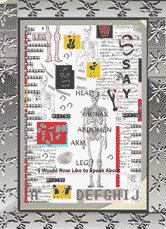

*
Ex Voto
"I give thanks to Señor Saint Isidro for having allowed this cow to be healed when it had broken a horn in 1998.""My Mother, we give you infinite thanks for getting us out of that place where we went at the fault of our brothers. Carlos y Guadalupe. November 4, 1963."
Something good happens, and the artist paints a little picture and writes a little narrative in gratitude to the saint believed responsible.
"The boy Juan gives thanks to the Holy Child for having guarded him when when he stepped on a viper in 1995."
"The Virgin of Guadeloupe healed this lady from a fall in January, 1999."
"The Lady gives thanks to the Holy Child of Atocha when she got lost in 1993."
*
As far as I know, I have no guardian angel. If I did, how would I thank her? I've been lost since late winter or early spring of 1974. I've fallen many times without dying, though I haven't exactly stood back up. And snakes—well. Snakes are fine. Snakes are ok.
ex voto to st. john, my husband
ex voto to Ojai, my hometown
ex voto to poetry
ex voto to the mountains around my hometown
ex voto to ultimate mystery
ex voto to prozak
ex voto to jesus that time in the marble mountains
ex voto to sweet prairie wind on a summer night
ex voto to sweet prairie light at dusk
ex voto to the Sundance Channel
ex voto to books
ex voto to relief after five years since my mom
ex voto to john, since I can't ex voto him enough
ex voto to the internet
ex voto to hilarity
ex voto to hand lotion
ex voto to Christmas, though not anymore; it's just a big drag
I hope I will not be punished for this
I am not Catholic; I have no saints to thank
*
"I give infinite thanks to San Pascual, because the casserole of mole sauce did not fall on the boy and he wasn't burned. Maura Coyotzi. Puebla de los Angeles. 1918." This one is fake. Someone is out actually out there, mocking up these things. But you can buy the fake, labeled clearly "fake," on the Web.
La Catrina.
What's with this la catrina person, anyway? The "well-dressed woman" of the Mexican loteria. Her image on cards and trinkets, store windows, crucifixes. The woman who is out, outside, on the streets, getting around, being seen, her voluminous hat like a halo in molt.
Images of Frida are everywhere too, Frida of the obsessive self-stare.
There's actually something called Kahloism.: Frida
religion. Tongue-in-cheek, I'm sure, though we seem to need a mother cult
regardless, however updated, revamped, and improvised: the Mona Lisa as
Riot Gyrrl, Venus de Milo in custom prosthetic. Mother Mary herself
slipping out at
Somebody told me they weren't that crazy about Frida Kahlo's work, her narcissistic self-gazing, but I think it's something. In a culture where a woman is either utterly venerated or utterly erased, I would look at myself in the mirror for a long time too.
The immaculate mother of Christ on the one hand; boobs and a hole on the other.
I would stare into the mirror with astonished interest and disbelief too.
Or maybe just glare. Like Frida.
I would study the mirror to see what was there between everything and nothing.
*
 Oh
my god, here she is posing on her own death bed. Candy skull with her name
on its forehead no less. Frida said she didn't know she was a surrealist
until the surrealists told her she was.
Oh
my god, here she is posing on her own death bed. Candy skull with her name
on its forehead no less. Frida said she didn't know she was a surrealist
until the surrealists told her she was.
The picture above is a ceramic magnet I hang on my refrigerator.
*
I don't think la catrina especially relished her inherited role of divine and sexless governess of hearth and heart. I don't think she majored in Nurse of the Earth or Lactating Breast of the Planet. I didn't either.
But maybe mortal and horny caretaker of earth, hearth, and heart would work. Yes, that would be fine.
Somebody's got to.
Men should reinvent themselves in the new script too. If I can do it, odd entity that I am, anyone can, though I'm not saying I necessarily can. How different or similar to themselves should men try to be? How different or similar to women should they be? If we could just retwist—not straighten—this doubleness that seems to have twisted us up…
I'm afraid. I'm afraid, Dave.
But excuse me. I'm speaking here from the mind, solamente. Miserable bloody thorn.
*
"I drank to drown my pain, but the damned pain learned how to swim. . ." —Frida.
We can't outwrite the body. Right?
Talavera.
Two kinds of clay fired twice, glazes rich in minerals, they make bright surfaces on top of other surfaces. Each is painted with sometimes intricate patterns and then added to intricate patterns, and they are painted sometimes with figural pictures and then arranged sometimes into figural pictures. There is the picture too, of course, of the wall or building or floor or stairway which displays these pictures, and sometimes it all becomes a book, observed by someone observing herself in the act of reading the book. That the glaze itself is a kind of clay is hardly surprising. That distinctions between "same" and "different" are at once intensified and erased is hardly surprising. That with time their surfaces grow beautifully and valuably "crazed" and that people still make them and paint them by hand leaves me with a deep feeling of of course.
*

Miracle of the miniature symbol. Clipart. International road sign. Web emoticon. Hand signal. I'd like to cover a wall in milagros. Masses of the little suckers. Try to find at what point they no longer mean. If I collect enough, if I display enough. Will I know that they do truly mean— because, in such quantities, they will cease to? Indeed, after all, the miracles are overwhelming. They occur, have occurred, in boggling numbers since time began, they are everywhere at this instant, and they are real. And they have ceased. That is the great tragedy of the Information Age: inundation by the miraculous has murdered the miraculous.
(Sadness, terror, and misery, however, are still doing pretty well.)
Perhaps the appeal of such icons, for me, is that I hate and dread so much the power of ADVERTISING LOGOS AND SLOGANS. When watching mass-market movies these days, I spend a certain amount of my time just looking for product placement. Just looking to see where the fuckers got one in. Coke is It. Just Do It. I was mesmerized by the multi-hour Fed-Ex commercial, for instance, which the movie Cast Away was. I thought the ads would stop after Hanks' character got trapped on the island, but then Fed-Ex boxes started washing up on the beach. How ingenious, indeed, of Fed-Ex: a company dedicated to speed, need and acquisition heart attacks aligns itself with a film whose message is the ultimate futility and meaninglessness of time and possession. Now when we think "Fed Ex," we think the opposite of what Fed Ex is, and therefore we like it and buy it. Sweet Jesus.
*
What now is our ground? What marches or flights?
*
I would add to traditional milagros: the pill (prozac or birth control) and the bloody thorn (which I love and hate).
*
Driving to work, I realize my windshield is actually a screen. And later, walking to class, I realize my whole field of vision is a screen. I'm afraid.
*
I'm afraid that the body is only more writing. Writing can't outwrite writing. Trying to outbody the body only produces… more fleshtext. Flext. Fine. Let's stop trying. Let's concentrate instead on rewriting. Only problem is: we need something for starters. We need something to go on. And what if those basic materials—of culture, of history, of individual lives, of individual bodies—are less, maybe greatly less, than satisfactory?
Amates, devotional cloths.
Words as Stuff.
"Charms, Riddles, Word Puzzles, and Folk Tradition: oral and/or literary charms; oral and/or literary riddles; visual puns; rebus puzzles; crossword puzzles; advertising charms; commercial charms; military charms; word magic. One of the most loveable characteristics of human beings is their persistent tendency to find new and frivolous uses for things. Words were designed for the serious business of communication but humans constantly devise novel uses for them. Babies play with the sound of words. Young children delight in rhyme, reveling in the fact that one word sounds like another. All poetry--indeed, all writing--is a kind of word play: slotting words into appropriate (or inappropriate) places, shifting words around like the pieces of a jigsaw puzzle and choosing those that make up a particular pattern. Our session will explore the implications of this glorious perversity. Send 1-2 page abstracts to: Dr. Gregg A. Hecimovich, 2003 SAMLA Folklore Program Chair Department of English, Bate Building 2202, East Carolina University, Greenville NC 27858-4353; <hecimovichg@mail.ecu.edu>." From U. of Penn listserve, cfp@english.upenn.edu
More.
I want to take photos of the Mexican food aisle at Moorhead CashWise. Crinkly
packs of multi-colored candy and trinkets. Fruit drinks and cola in bottles.
Big two-pound cans of the densely green, sometimes almost black, poblano
chile pepper. Miracles, here in
I want to make a retablo of alternative, peacenik "soldiers":
las soldaderas of the Revolution.
The Ojai Post Office. Something.
I don't know what. Because its noontime bells were requiem
to joy for any child on a ten-speed in July, circa 1973.
And I want to do something with middle-class white american kitsch. The beautiful, moving, ugly and rustic, religio-commercial folk art STUFF of america. The easter card; halloween and thanksgiving window and table art; the secular figurine; the empty obsessive icon: owl, cow, frog, mushroom, angel; the new age obsessive moon and sun, crystal, angel, yin-yang sign, katrina figure. And recent faux country style: fabrics, figurines, handicrafts both purely decorative and semi-functional. I'd like to do something with christmas cards, too. Something I send out to people routinely as a way to say hello, stay in touch, though I have reservations about coercive, expensive, and sometimes exhausting cultural rituals. Make my poems and graphics experiments mesh with the rituals I do choose to observe. How would I make some of the weird stuff I want to write or otherwise create accessible and enjoyable to my family and old friends? Be nice, be very very nice if one could MERGE energies that way.
A Nicho Dedicated to California Health Food: tiny vials of wheat grass juice. Thumb-sized baggies of sprouts. Miniature bin after bin of beans, seeds, and trail mix, assorted course-ground flours and legumes. Tiny replicas of fresh rotting organic carrots, lettuce, and apples that nobody buys. Candles and incense, loofa sponges on strings, salts and sandy milks for the bath. Lavender, to calm us all down.
I'm afraid.
What marches or flights?
*
Retablos depicting el corazon. A
series of retablos on el corazon.
The heart in theory. Theorizing
the heart.
The skull itself grins at the very idea.
*
Oh, corazon.
What ground?
| The bereaved have something like cotton in their ears and their ears in their stomachs and their hearts overwhelming their bodies. They can hear nothing but the small, high-pitched sounds coming from the mouths of the living and the droning, low-pitched sounds coming from the mouths of the dead. During Dias de Muertos, in some places, musicians go door to door,
singing parodic epitaphs for the living members of each household.
Odd custom—one of many I can't possibly begin to imagine in
(In Everyone in
*
Kids in schools make word puzzles, bark paintings, sand paintings, socks and shoes of death. They make skeletons out of styrofoam, wheat paste, paper sacks and colored yarn, colored tinfoil and amazing meringue. Everyone makes skeletons and the skeletons are Everyone: drawn or crudely sculpted figurines, they stand for cooks, dentists, bicyclists, barbers, partiers, shoppers, sleepers, bus drivers, writers. Skeletons go to the movies, make tamales, get drunk, get laid, get married. They dress up. They seem very much to enjoy dressing up. "Mother with Baby in Stroller." "Veterinarian with Pig." Some of the calaveras are pretty serious, depicted at times with worms coming out of the mouths, with beetles and even lizards crawling all over. I mean, damn. I'll say it again: people eat sugar skulls labeled with the names of their dead. I am too white for this. it is widely known that the Dead
love sugar
I'm peering through a crack in a cultural wall. Is that ok? I'm a bookish voyeur of a people long subjected to my country's heinous imperialist shit. One more imperialist indignity, right? that from my relatively cozy white quarters where I guzzle coffee all morning and surf the net, I raid their country for literary loot. In my defense, however, I guess I'll say, as so many imperialists and tyrants do, that I really don't have it all that great myself. I don't exactly know what my own culture is. My heart's in pieces. Mini Marts, Christmas, sitcoms, super malls even weddings sometimes depress me. I'm in academia, but not really, a permanently temporary integrated adjunct. Marginal among the marginal, but of course it's all relative and I'm hardly starving, either. It's confusing. (On the internet, you can buy
a retablo of Saint Rita of Desperation: It truly is confusing. But again in my defense I will venture: bones are the property of none. The skull itself grins at the very idea. * I love that Posada sketch where the calaveras themselves are grooving to Dias de Muertos, hanging out all night in the cemetery, looking a lot like the living in their cowboy hats and guitars. That's what made this guy Posada so good: the way he kept mixing them up. Crying and laughing and singing and eating and wringing their bony hands over the dead. That gets me. Obvious message to mourners: Already. Everyone. * Oct. 29 is for the unholy, the uncleansed. Oct. 30 for the lone soul, soul with no one. Oct. 31 for the children (thus, Halloween in America). And Nov.1 and 2 are for the adults. It is on these days that families hang out in the cemeteries, at the decorated gravesites, all through the night in candle-lit vigils. mexconnect.com: "In contrast to urban graveyards, no one laughs or drinks. While the graves are decorated, the atmosphere is industrious, and then settles into a reverie, as candles flicker and locals settle into their blankets for a long, cold night. It is not recognizably mournful, nor intensely meditative—more a sort of limbo enhanced by the aroma of copal incense, mixed with the smell of hot candle wax, fading damp flowers and weeds from the lake." flowers, for their light All of those European traditions where the dead return in the fall—it isn't about the dead, I think, so much as the living. They have finished the hard work of the harvest and are ready. They have stopped. So death has an opening, see. It comes in like a big, slow fog. Much of it's set up, after all, according to the needs and grieving cycles of the living. It's a space we clear with intent to recognize the space that was cleared for us whether we like it or not. We have to make special preparations, we have to sanctify it, we have to communally agree, because otherwise it would swarm us all year. It would come annoyingly in-between acts, at increasingly frequent intervals. It would gradually grow louder than other sounds. It would sneak itself in to ballgames and movies and schoolbooks. It would turn holidays like Christmas into celebrations of money and death. It would spill black liquid filth into the oceans, it would ransack small countries and make war for the sake of a flammable liquor that makes us more and more thirsty. Without Dias de Muertos, basically, death would become a real asshole, a rough beast, stepping over human beings who sleep on grates, making expediency virtuous, admitting to nothing, unable to look its own children in the eye, hypocrisy the alien the blob the godzilla the witch that recycles, the endless sequel, it won't go away, too sad and fucked up to admit that it's sad and fucked up, death would become America. *
*
Dias de Muertos alter for my mother. For this I would leave certain gaps. Can't give when nothing was given to give back again, eh, mom? Un esqueleto en cada ropero. But of course I'd leave lots of good things too, there on the table. Color. I'd leave color, because she hated "hippy rags." I'd leave some books, even the trashy historical romances she was reading in her loneliness near the end. Of course I'd have to leave some things to tempt her there to begin with. What would tempt my mom to come back? The main thing she had was her kids, whom she did not have enough near the end, but had too much near the start. Said I was always following her around, picking on her arm or sweater. Needing. I don't think I was really all that much to handle, but together with four other kids I no doubt was. Second to last. An utterly forgettable, tiresome position. So guess I'd make myself, just myself, among other things, available at the alter, not looking too needy or anything. Just there if she needs me or wants me. This is for her, after all, and it's the least I can do. It's easy for me to be generous, since I am, after all, alive. I'm the one who's alive. Likewise it's certainly easy for her in this case to be the Virgin of Guadeloupe herself, it's no problem at all for her now. The very Mother Mary herself, for me, for god's sake, it's the very least she can do, being dead. I'd try somehow to leave I'm sorry. I'd set out the bread of finally healing and the ringing stones of go. I'd show indifference to the million, minor inanities. (Kellie: I'd show indifference to the million, minor inanities.) And I'd show thanks—not to my mother the saint, not to the Great Holy Womb, but to my mother Martha of Oklahoma City, maiden name McGee, the woman who gave me my heart.
|
I'm having, as they say, a brush, at least a brush, with cancer. I have it. It's minor, they say. Grade 1. Funny that cancer gets graded. Even cancer gets graded. 1,2,3,4. 4 is bad. So I guess I have A cancer. I have "the best" of cancer. I won't know if it's worse until the surgery and more tests, a week away. Spent two very dismal days trying to believe, lying down at night was the killer, realizing that I'd probably waited too long to see a doctor, regret's little white teeth coming out…but not even knowing whether I had to believe, because it still could be nothing given treatment, though it's definitely something. Grade 1. I don't know whether the surgery will get it all, they don't know whether it's really lodged in, and so on. Oh my god, I've heard all this before. Am I embarking on the "long fight with cancer" thing? Oh my god. But I'm just now feeling suddenly light light. Because I can write about it. Does this make me a real writer. Fuck you, I guess it does. I think of Frank O'Hara's sweet poem, here I am the center of all beauty writing these poems imagine! And that other poem of his it is even in prose I am a real poet. "In Place of Future Gone By." In light of cancer, how grim is the subtitle I've used in other pieces I've written. Now it doesn't refer to accelerating technological change, but to myself, already gone. My future. I'm. Now I even wonder: when we talk about the whole Future Shock thing, are we really talking about some heightened terror of death, some heightened sense of its immanence, and not anything to do with technological change? Technology as ruse. Does living amidst vast, vastly complex, all-pervasive and even omniscient technology just give us the sense of death breathing down our necks? We build technology to shield ourselves from death, but technology only speeds the feeling of death's approach… I actually feel, at this moment, that I'm somewhat protected from death—because I can write about it. I can write about being sick all the way up to the very moment of death's possible immanent arrival and so I am safe. I'm safe, I'm ok. I just realized that I can write about it all the way to the end. I feel better. Writing as sterilization of bad cells. Wonder if I'll still feel this way if it really does get worse. I wonder if writing will matter a damn, then. Very, very strange…am I actually worried about whether any of my stuff will be published after I'm gone? Am I actually writing in hopes yet again of publication, even when I'm gone? I never knew that the alleged desire for immortality in writers could be this idiotically real. Oh yeah, and I wonder if years of loneliness and years of writing out of various stages of desperation has prepared me to approach writing as a goddamn life jacket. Any time I've ever thought of it that way in the past, however, I've almost immediately censured myself for being melodramatic. But I have to say, right at this moment, it feels like a life jacket. Precancerous. I've heard this word before and it was very alarming. But today it's a word that would be downright soothing if only my doctor would say it. He won't. Four pathologists concurred. This
is this.
02/17/03 Had surgery ten days ago. The works.
Went updown andeverywhichway emotionally during my few days in the
hospital, kept awake at night by a gonzo nurse named Sheldon. Sheldon
is nearly fanatical about John Wayne, John Wayne and that protein
intensive Atkins diet and he just really, really eats meat. The
guy eats meat. A hunter big-time. Loves Sandhill Crane. I didn't
know anybody ate any kind of crane. He grills Sandhill Crane for
his kids and they love it. He kept me laughing and talking until,
by my second and third nights, I was feeling increasingly awful,
tired and rundown. Not exactly what a hospital nurse should be doing.
(John said the guy was two cans of peas and some hate literature
short of being a survivalist.) But I shouldn't blame Sheldon. I
was initially looped and energetic on morphine, then down and weepy,
then home for a day before Bro (doc) called with the results of
the surgery tests. The C (now rated Grade 1-2) had in fact invaded
the wall (from the lining), and a fair distance in, though lymph
system etc. checked out ok. Now I'll have radiation. No they site
percentages which slide around like soap on a shower floor—80-90%,
70-90%, 50-70%. After five years you'll be considered cured. The days are going by. I start crying at nothing. Violent movies scare me. I seem to need John around all the time. Can't stand for him to be out of my sight. Worried about what I have and haven't accomplished, what will I do with my things, my stuff, my clothes and kites, given that my life is both here and in California. . . Where should I ship my heart for burial? Perhaps I'll go in pieces. Mind in Fargo, heart in Ojai. But part of my heart has to be here with John, of course. Maybe I should ask to be cut up into dozens of pieces and spread all over the county. My body a slow-motion continental explosion, it does and doesn't belong, exactly, anywhere. How does one request burial in No Place? "Place" perhaps will have to be whatever is easiest on the living. "Place" not as geography, but as compassionate condition or conditions. Two weeks off work, I sit on the couch
If I patch a spot just fine while
sitting, Never my whole goddamn life Late at night in bed, "praying." Late at night in bed, praying. I want to have done something that matters. I want to be without regret. Being with John. Sitting there on the couch, his head propped on a pillow while I lightly rub his forehead, fiddle with his hair. How to write didactic stuff, while still being "true" or attentive to the ambiguities of life? How write anything that genuinely helps anybody? How to write something that helps anybody live. It's all an unbelievable nightmare, do we have to "write the nightmare" to live it. Is good writing always terrifying. I have thought at times that it is. "Good writing." Whatever. 02/21/02 Two weeks since operation. Our administrative assistant recently asked, in an email, what I'd like her to tell people inquiring about my surgery. "She's come down with a slight case of uterus removal." A "white" morning. Not exactly gray. Sky looks like skim milk. It's still. No, it's snowing. Weird suffering of the terminally ill or of the ambiguously terminally ill: how to create a DYING Weird suffering of all of us. How to create a way of being in the
meantime, in just this particular kind I should have told you this long ago. Find myself watching schlock on the tube—Dr. Quinn, jesus, and Capra-type flicks. I've never before so appreciated why people need this stuff. Soothe. Lie. Press the self-administer button. Certainly explains all those WWII and post-WWII musicals. * And flowers. They came into my room gradually till they nearly filled it up. People I love, good wishes, partially encircling me, on shelves near the door and near the private bathroom, growing denser, bright bouquets and little cards, bows, baskets, fragile bits of fern, carnations, candies, packets of plant food, small stuffed bears, irises and roses, rising and gathering around me, filling and pressing, clouds of dry and airy baby's breath, I'm almost already gone. * The reality and value of dream/poetic truths. The reality and value of medical truths. I usually question everything. I'm absorbed by ideas, which are always tenuous. Realm of intuitive connections and the nonliteral. Consequently, I feel disbelieving and stunned when someone simply says to me: this is this. Part of my pleasure in ideas is the way they magnetically gather together their small sharp distinctions, the way they are then, brilliantly, clearly, themselves. But likewise I love how they consequently blur and soften and suffer when visited by competing ideas which also are true. By now, of course, like any good committed relativist, I know that any foundation of ideas is like the floor of an old decrepit house. So I forgo, I defy, "foundations." I live consciously and deliberately instead in a sea of ideas. I float on silly little rafts of social protocol in immense and terrifying and beautiful flux. I love the flux. I have made a solid floor of flux. I am human. This is this. This is this—maybe. * 02/27/03 The horrendous gloom I felt right after visiting the radiation people for a first consultation has lightened incredibly. I don't know what to attribute this to—denial, acceptance, necessity, numbness—but I've been sharply aware of it as each day passes. I had been teetering on a fence and there was no way to be anything like comfortable, balanced, decisive. I couldn't assume life, but I couldn't assume end of life either. Things could go either way. Future and no future at once, what is that? As of today, however, and the last several days, I seem to be leaning, simply, without trying, towards the assumption of time, life, and future. Denial, acceptance, necessity, numbness. I've started to tinker again with long-term projects, and am even reading a novel (in verse, by Vikram Seth). Throughout the worst of this I have felt zero desire or need to read novels. Facing death, it has seemed utterly pointless and even somehow mildly obscene to lose myself in the particulars of some fictional character's life. The particulars of my own life are staring me down and grabbing me by the shoulders. Theory & philosophy seemed likewise irrelevant. Poetry—the only reading choice, right now, that makes any sense to me. Tomorrow I see the radiation people. They have to take measurements. They need to align their instruments. They plan to give me two tiny, precise tattoos. is this. |


